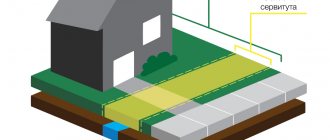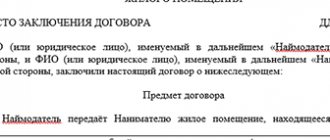Every person encounters free use almost every day. People pass certain things to each other, give them as gifts or let them use them for a while. If it concerns small everyday items that are not of particular value, then the contract is not concluded. The need to take out a loan appears only when a valuable material thing is transferred for use. This could be a car, land, residential premises, etc. To avoid any questions from the state and the tax inspectorate, such transactions must be registered on paper. This is quite easy to do. No additional cash costs will be required. But before drawing up a contract, it is recommended to familiarize yourself with all the nuances of the design and pitfalls. Consider the nuances of the agreement for the gratuitous use of residential premises in the article.
What is an agreement for the gratuitous use of residential premises in the Civil Code of the Russian Federation?
An agreement in civil law is intended to establish the relationship between a person who gives something for use and a person who accepts some material benefit for use. Such a legal act resembles a lease. However, there is one main difference: the gratuitous use of property does not involve the collection of fees.
An agreement for the free use of residential premises is concluded when it is necessary to provide housing to a relative, close friend, etc. It contains mutually beneficial conditions, following which each party receives a certain benefit.
This type of document in modern jurisprudence is usually called a loan. If we are talking about the transfer of an apartment, house, or part thereof, then you can use both the concept of an agreement and the concept of a loan. The person who gives the home for use is designated as the lender. The person who receives the residential premises is called the borrower.
A mandatory condition of the transaction is the full legal capacity of both parties to enter into the contract. This means that the lender and the borrower are aware of their actions and are ready to bear responsibility for compliance with the rules outlined in the loan.
It is necessary to distinguish a loan for free use from a lease. A lease agreement is concluded for the purpose of providing property for use for a certain period and receiving money for it. A gratuitous loan presupposes the right to reside and use property without paying for the provided property. However, both types of contracts are regulated by the civil law of the Russian Federation (Civil Code of the Russian Federation).
On the video agreement for the free use of residential premises:
sample agreement for free use of residential premises (apartment)
AGREEMENT FOR FREE USE OF RESIDENTIAL PREMISES (APARTMENT) ______________
“___” _____________ 20___ Citizen of the Russian Federation ____________________, passport series ______ No. ___________, issued by _________________________________, “____” ___________ 20___, division code _____________, registered at the address: _____________________, hereinafter referred to as the “Lenter”, on the one hand, and
Citizen of the Russian Federation ____________________, passport series ______ No. ___________,
issued _________________________________, "____" ___________ 20___, department code _____________, registered at the address: _____________________,
hereinafter referred to as the “Tenant”, on the other hand, collectively referred to as the “Parties”, have entered into this agreement as follows:
1. SUBJECT OF THE AGREEMENT 1.1. Under this agreement, the Landlord undertakes to provide the Tenant for free use, for living, with residential premises owned by the Landlord - an apartment with a total area of _____, (cadastral number _______________) located at the address: ___________ (hereinafter referred to as the Residential Premises). The tenant undertakes to accept the specified residential premises, and in the event of termination of this agreement, to return the residential premises in the condition in which it was received, taking into account normal wear and tear. 1.2. The right of ownership of the residential premises specified in clause 1.1 of this agreement belongs to the Landlord on the basis of ____________, about which in ____________ “___”_______ ______ the registration record No. ______ was made and ____________ the Certificate of State Registration of Rights _______ No. _______ dated “___” was issued. __________ _______ of the year. 1.3. If during the term of this agreement the Tenant, with the consent of the Landlord, made improvements to the transferred item, then, as determined by the parties to the agreement, the following procedure will apply: • separable improvements are the property of the Tenant; • if the Tenant, at his own expense, has made improvements to a thing that is inseparable without harm to it, he does not have the right to claim real compensation from the Landlord. 1.4. The Landlord guarantees that the transferred Premises are not under arrest and prohibition and are not transferred for use to third parties for any reason. 2. RIGHTS AND OBLIGATIONS OF THE PARTIES 2.1. The Landlord is obliged: • within three days after signing this Agreement, provide the residential premises specified in clause 1.1 of this Agreement in a vacant form to the Tenant according to the acceptance certificate, which is an integral part of this Agreement, and hand over the keys to the door locks to him; • provide the Tenant with free access to the residential premises within the same period; • in the presence of the Tenant, check the serviceability of the transferred property, familiarize the Tenant with the rules for operating this property, warn the Tenant about all the shortcomings of the residential premises transferred for use; • during the period of validity of the contract, provide the Tenant with consulting, information, technical and other assistance for the purpose of the most effective and competent use of the property transferred under this Agreement. 2.2. Tenants undertake to: • use the residential premises strictly for their intended purpose (for living); • maintain the residential premises in technically sound and proper sanitary condition; • bear all costs of maintaining the residential premises, including paying for utilities at your own expense (electricity, heating, gas supply, water supply and sewerage, garbage removal, etc.) and making the above payments on time; • do not transfer the residential premises for use to third parties without the prior consent of the Landlord; • carry out routine repairs of residential premises in a timely manner and at your own expense; • when using residential premises, do not violate the rights and interests of neighbors and other persons; • make all inseparable changes to the residential premises only with the prior written consent of the Landlord; • return the received residential premises within 14 (fourteen) days after the expiration of this agreement or its termination for other reasons in the condition determined by the parties to the agreement; • perform other duties arising from the right to use residential premises. 3. RESPONSIBILITY OF THE PARTIES 3.1. A party to a contract whose property interests were violated as a result of non-fulfillment or improper fulfillment of obligations under the contract by the other party has the right to demand full compensation for losses caused to it by this party, which are understood as expenses that the party whose right was violated has made or will have to make to restore its rights and interests; loss, damage or damage to property (real damage), as well as lost income that this party would have received under normal business conditions if its rights and interests had not been violated (lost profits). 3.2. Any of the parties to this Agreement that has not fulfilled its obligations under the contract or has performed them improperly shall be liable for the above in the presence of guilt (intention or negligence). The absence of guilt for non-fulfillment or improper fulfillment of obligations under the contract is proven by the party that violated the obligations. 3.3. A party that fails to fulfill or improperly fulfills its obligations under a contract when fulfilling its terms is liable unless it proves that proper fulfillment of obligations was impossible due to force majeure circumstances (force majeure), i.e. emergency and unavoidable circumstances under specific conditions of a specific period of time. The parties to this agreement included the following events as force majeure circumstances: • earthquake, flood, lightning strike, volcanic eruption, mudflow, landslide, tsunami, etc.; • temperature, wind strength and precipitation level at the place of fulfillment of obligations under the contract, excluding normal life activities for a person; • moratorium of authorities and management; • strikes organized in accordance with the procedure established by law; • and other circumstances that may be determined by the parties to the contract as force majeure for the proper fulfillment of obligations. 3.4. The Lessor is responsible for defects in the property that he intentionally or through gross negligence did not stipulate when concluding this agreement and about which he was not informed by the Tenant. 3.5. The Lessor is responsible for harm caused to a third party from the use of the transferred property, unless he proves that the harm was caused by the fault of the Lessee. 3.6. The tenant bears the risk of accidental death or damage to the residential premises if: • death or damage occurred as a result of using the residential premises not in accordance with the contract or purpose; • death or damage occurred as a result of the transfer of property to a third party without the consent of the Lessor. 4. TERMINATION OF THE AGREEMENT 4.1. The Lessor has the right to cancel the Agreement at any time by notifying the Tenant in writing 2 (two) months before cancellation. If the Landlord refuses to further fulfill this agreement, the Tenant is subject to eviction from the residential premises within the period established by the agreement, and the residential premises are subject to return to the Landlord on the basis of an acceptance certificate signed by both parties. 4.2. The Tenant has the right to cancel the Agreement at any time by notifying the Landlord in writing 1 (one) month in advance and returning the residential premises to the Landlord according to the acceptance certificate. 4.3. The Agreement is subject to early termination at the request of the Landlord, and the Tenant is subject to eviction if the Tenant: • uses the housing for purposes other than those established in clause 1.1. actual agreement; • intentionally damages or recklessly destroys residential premises, otherwise significantly worsens its condition, and also systematically violates the rights and interests of neighbors and other persons; • systematically violates obligations under the contract; • fails to fulfill obligations to maintain the residential premises in good condition or maintain them; • without the consent of the Landlord, transfers the residential premises for use to a third party. 4.4. The tenant has the right to demand early termination of this agreement if: • he discovers deficiencies that make the normal use of the residential premises impossible or burdensome, the presence of which was not known at the time the agreement was concluded; • due to circumstances for which the Tenant is not responsible, the residential premises will be in an unusable condition; • when concluding the contract, the Landlord did not warn the Tenant about the rights of third parties to the transferred residential premises; • The Landlord has not transferred the residential premises to the Tenant, or is creating obstacles in the use of the residential premises. 5. PROCEDURE FOR RESOLVING DISPUTES, AMENDING AND/OR ADDING TO THE AGREEMENT 5.1. Disputes that may arise during the implementation of the terms of this Agreement, the parties will strive to resolve amicably through pre-trial proceedings: through negotiations, exchange of letters, clarification of the terms of the agreement, drawing up the necessary protocols, additions and changes, etc. 5.2. If a mutually acceptable solution is not reached, the parties have the right to submit the disputed issue for resolution in court in accordance with the current legislation of the Russian Federation. 5.3. This agreement may be amended and/or supplemented by the parties during the period of its validity on the basis of their mutual consent and the presence of objective reasons that caused such actions of the parties. 5.4. Any agreements of the parties to amend and/or supplement the terms of this agreement are valid if they are in writing and signed by both parties to the agreement. 6. OTHER CONDITIONS 6.1. This Agreement is drawn up in Russian in two identical copies, one for each of the parties, having equal legal force. 6.2. This Agreement comes into force from the date of its signing by both parties, from which it becomes binding on the parties who entered into it. The terms of this agreement apply to the relations of the parties that arose only after the conclusion of this Agreement. 7. SIGNATURES OF THE RENTER PARTIES:
EMPLOYER:
Appendix No. 1 to the agreement for the free use of residential premises (apartment) dated “____” ________________ 20___
_______________ "___" _______________ 20___
ACT OF ACCEPTANCE AND TRANSFER
Citizen of the Russian Federation ____________________, passport series ______ No. ___________, issued by _________________________________, “____” ___________ 20___, subdivision code _____________, registered at the address: _____________________, hereinafter referred to as the “Lenter”, on the one hand, and
Citizen of the Russian Federation ____________________, passport series ______ No. ___________,
issued _________________________________, "____" ___________ 20___, department code _____________, registered at the address: _____________________,
hereinafter referred to as the “Tenant”, on the other hand, collectively referred to as the “Parties”, have drawn up this act as follows:
The Landlord transferred and the Tenant accepted for free use residential premises - an apartment with a total area of _______________, (cadastral number __________________) located at the address: ____________________________. The tenant accepts the residential premises for free use in high-quality condition as it is on the day of signing the agreement for free use. The Landlord also transfers to the Tenant: sets of keys to all locks of the front door, documents confirming the absence of debts in payment of expenses for maintaining the apartment and the common property of the residential building. During the acceptance and transfer of the apartment, the parties established that the condition of the apartment, as well as the power supply system, engineering networks and communications, was satisfactory. The Tenant has no claims regarding the technical and sanitary condition of the apartment and the property located in it. The parties established that visible shortcomings of the transferred apartment are not grounds for termination of the contract for gratuitous use. This act confirms the fact of transfer of the above apartment from the Landlord to the Tenant. This act is drawn up and signed in two copies having equal legal force, and one is kept by each of the parties. RENTER:
EMPLOYER:
Nuances of drawing up a loan agreement, the validity period of the rental agreement
Legal documents can indicate the period for which the housing is transferred for use to the borrower. If the term is not specified or this is not necessary, then it is generally accepted that the loan is given for an indefinite period. However, in this case, both the lender and the borrower can terminate the agreement at any time.
This type of legal act does not need to be notarized. No stamps required. All that remains is the signatures of both parties. The loan agreement is concluded in writing. If the borrower and the lender do not insist on a paper version, then the transaction takes place orally.
What is the tax refund when buying real estate with a mortgage is detailed in this article.
Who has the right to inherit an apartment after the death of the father is detailed in this article.
What documents are required to register an inheritance for an apartment are detailed here: https://ruleconsult.ru/grazhdanskoe/nasledstvo/dokumenty-dlya-vstupleniya-na-kvartiru.html
In any case, it is recommended to conclude an agreement, since with the help of this legal act specific norms can be approved.
The main advantages include the following rules of transfer and use:
- Clear recording of all conditions. Both parties sign and undertake to follow all instructions. This is a guarantee of reliability and safety.
- The borrower, according to the agreement, undertakes to pay utilities and other payments significant for housing.
- Guaranteed safety of material goods. The housing is given for use, and the borrower undertakes to monitor the condition of all things that belong to the lender and protect them from breakage and disappearance. If any item is lost or breaks, the borrower is obliged to compensate for the damage.
- Registration of the borrower at the location of the housing provided under the loan agreement. The person who is given housing has the right to temporarily register there, thereby officially registering his place of residence.
"Underwater rocks"
When drawing up such a legal document, you may encounter some pitfalls. By providing living space for use for a certain time, the lender does not have the right to evict the tenant, even if the latter neglects the rules. If the agreement is drawn up and certified by the signatures of both parties, then the law most often takes the side of the borrower.
RIGHTS AND OBLIGATIONS OF THE PARTIES
2.1. The Landlord undertakes to provide the Tenant with residential premises in a condition consistent with the terms of this agreement and its purpose. 2.2. The tenant undertakes: a) to use the residential premises strictly for their intended purpose (for living); b) keep the living quarters in good condition; c) bear all expenses for the maintenance of the residential premises, including paying for utilities at your own expense; d) not transfer the residential premises for use to third parties without the prior consent of the Landlord; e) at his own expense, carry out current and major repairs of residential premises; f) perform other duties arising from the right to use residential premises. 2.3. The Tenant has the right at any time, at his own expense, at his own discretion, to make any improvements to the residential premises in the prescribed manner without the prior consent of the Landlord.
Contents of the agreement
Both renting and hiring involve compensation for the delivery of housing for use. That is, the absence in the contract of a condition for payment for the use of housing is the main difference between gratuitous use and contracts that imply payment.
Due to this difference, an agreement for the gratuitous use of housing is classified by law into the category of agreements that have the nature of a loan.
The second significant difference of the type of agreement under consideration is the division of the parties to the agreement into the lender and the borrower, who in our case have all the characteristics of a tenant and a lessor.
Otherwise, the agreement for the gratuitous use of residential premises does not contain any differences from rental or rental agreements and must include all sections and clauses typical for agreements of this type.
Thus, an agreement for the gratuitous use of residential premises must contain:
- the place where the contract was drawn up and the date of its signing;
- last names, first names, patronymics and passport details of the parties to the agreement;
- description of the housing being rented out, including its location, area, number of rooms, condition, degree of furnishings and provision of furniture and household appliances;
- information about whether the lender has the right to dispose of the residential premises;
- the obligation of the lender to provide the borrower with free use of residential premises and the counter-obligation of the borrower to accept the housing, use it for its intended purpose and treat it with care;
- the term of the contract, that is, the time period for which the lender transfers the housing for use. The same section may provide for the possibility of unilateral termination of the contract;
- the obligation of the borrower to return the housing at the end of the contract in a condition corresponding to the condition at the time of move-in, taking into account natural wear and tear;
- the borrower's responsibility for the safety of the residential premises;
- the amount of penalties for failure to fulfill the terms of the contract.
You can draw up an agreement yourself, or you can use the standard template available on the website. You just need to individualize it by entering into the text the specific circumstances of a particular transaction.
Agreement on determining the procedure for using residential premises
| [Agreement on determining the procedure for using residential premises] | 39 KB |
TERMS OF USE AGREEMENT
City of Novosibirsk "__" __________ 2014.
We, the undersigned:
Ivanov Ivan Ivanovich , born November 12, 1977, passport 50 01 123123, issued on December 19, 2003, Department of Internal Affairs of the Leninsky district of the city of Novosibirsk, registered at the address: Novosibirsk city, Shirokaya street, building 11, apartment 15,
Petrov Petr Petrovich , born November 25, 1978, passport 50 03 112222, issued on December 3, 2002, Department of Internal Affairs of the Leninsky district of the city of Novosibirsk, registered at the address: Novosibirsk city, Shirokaya street, building 11, apartment 13,
Alexey Alekseevich Alekseev , born on March 1, 1976, passport 50 03 171717, issued on June 28, 2002, Department of Internal Affairs of the Vengerovsky District of the Novosibirsk Region, registered at the address: Novosibirsk Region, Vengerovo village, Lenin Street, building 5, together referred to as the “Parties”, concluded this agreement as follows:
- Ivan Ivanovich Ivanov, Petr Petrovich Petrov, Aleksey Alekseevich Alekseev owns by right of common shared ownership an apartment, purpose - residential, with a total area of 58.6 sq.m., located at the address: Novosibirsk city, Permitina street, building 10, apartment 1, further in the text referred to as “apartment”.
- Ivanov Ivan Ivanovich owns 170/586 shares in the right of common shared ownership of the “apartment”.
- Petrov Petr Petrovich owns 260/586 shares in the right of common shared ownership of the “apartment”.
- Aleksey Alekseevich Alekseev owns 156/586 shares in the right of common shared ownership of the “apartment”.
- The apartment has undergone redevelopment, and therefore MIR LLC has drawn up a plan for the apartment after the redevelopment. According to the specified apartment plan, by this agreement the Parties establish the use of the “apartment” in the following order:
- Ivan Ivanovich Ivanov is given the use of premises: No. 4 (area 10.3 sq.m.), No. 5 (area 2.1 sq.m.), No. 6 (area 2.5 sq.m.);
- Petrov Petrov is given the use of premises: No. 7 (area 7.4 sq.m.), No. 8 (area 1.9 sq.m.), No. 9 (area 1.7 sq.m.), No. 10 (area 6.2 sq.m.), No. 11 (area 1.8 sq.m.), No. 12 (area 3.6 sq.m.);
- Alexey Alekseevich Alekseev is given the use of premises: No. 1 (area 10.4 sq.m.), No. 2 (area 1.9 sq.m.), No. 3 (area 1.7 sq.m.).
Premises No. 13 (area 7.0 sq.m.) is for common use by the parties.
- The Parties who signed this agreement informed each other that none of them has limited legal capacity, is not under guardianship, trusteeship, or patronage, is not under the influence of alcohol, drugs, or toxic substances, that none of them is under the influence of circumstances , forcing you to make a real deal. The health status of the parties to the transaction allows them to independently fulfill their obligations, protect and exercise their rights.
- This agreement comes into force from the moment it is signed by the parties. This agreement is not subject to registration.
- This agreement is drawn up in 3 copies, one copy for each of the parties.
Signatures of the parties:
___________________________________________________________________
____________________________________________________________________
____________________________________________________________________
Retention of ownership
Throughout the term of the agreement for the gratuitous use of residential premises, the lender retains its right of ownership. Because of this, any improvements made by the borrower in the residential premises will be considered the property of the lender.
If the improvements were made with the consent of the owner and significantly increased the value of the residential premises, while being inseparable from the premises, the lender will be obliged to reimburse the borrower for the cost of the improvements made.






